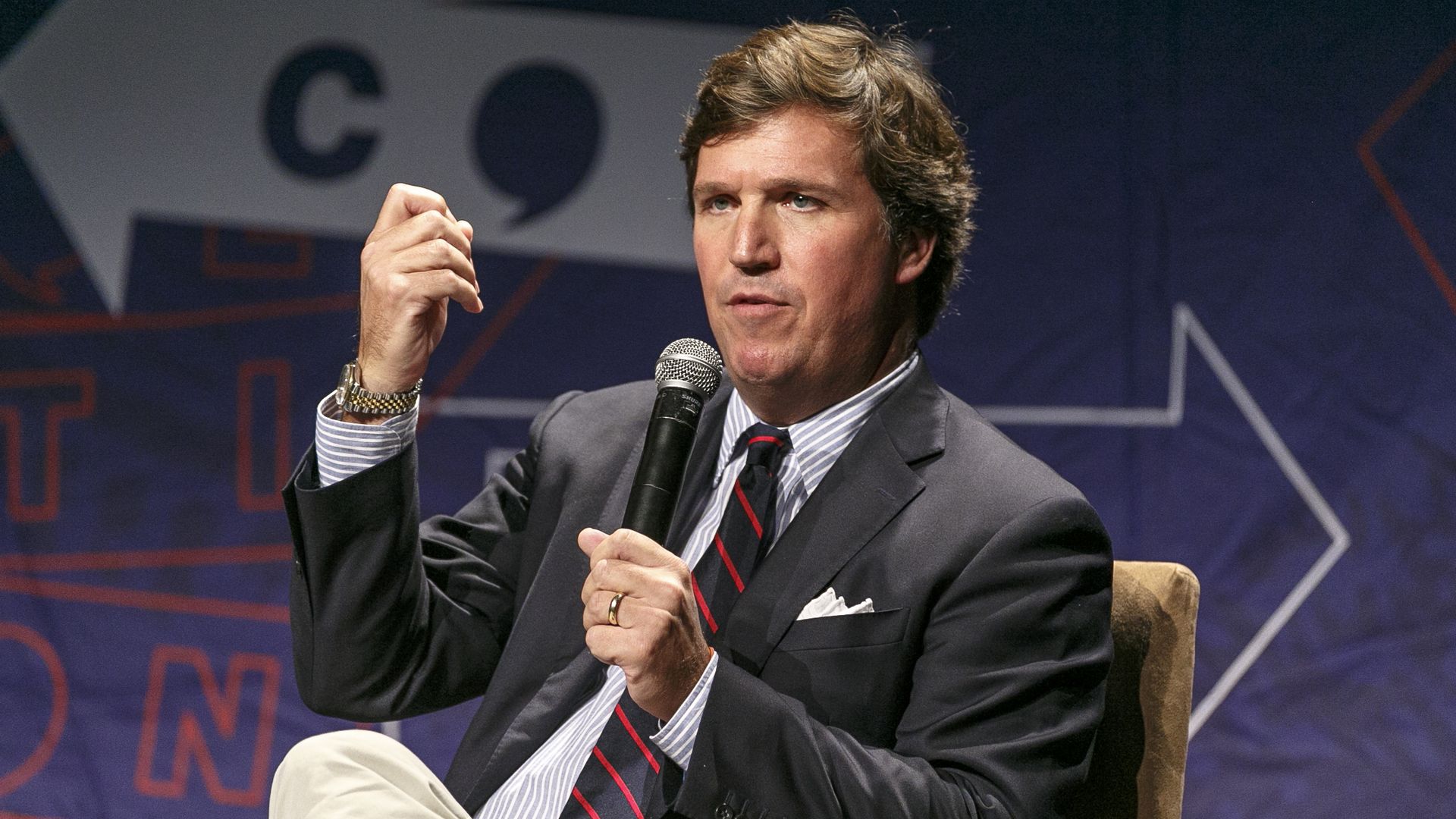Tucker Carlson sought interview with Putin at time of NSA spying claim
Scoop: Tucker Carlson sought Putin interview at time of spying claim

Jonathan Swan

Photo: Rich Polk/Getty Images for Politicon
Tucker Carlson was talking to U.S.-based Kremlin intermediaries about setting up an interview with Vladimir Putin shortly before the Fox News host accused the National Security Agency of spying on him, sources familiar with the conversations tell Axios.
Why it matters: Those sources said U.S. government officials learned about Carlson's efforts to secure the Putin interview. Carlson learned that the government was aware of his outreach — and that's the basis of his extraordinary accusation, followed by a rare public denial by the NSA that he had been targeted.
- Axios has not confirmed whether any communications from Carlson have been intercepted, and if so, why.
The backstory: Carlson told his roughly 3 million viewers on June 28 that the day before, he had heard "from a whistleblower within the U.S. government who reached out to warn us that the NSA … is monitoring our electronic communications and is planning to leak them in an attempt to take this show off the air."
- Carlson said his source, "who is in a position to know, repeated back to us information about a story that we are working on that could have only come directly from my texts and emails."
- "It's illegal for the NSA to spy on American citizens," Carlson added. "Things like that should not happen in America. But unfortunately, they do happen. And in this case, they did happen."
- The NSA said in a tweet the next night, as Carlson's show went on the air, that his "allegation is untrue."
- "Tucker Carlson has never been an intelligence target of the Agency and the NSA has never had any plans to try to take his program off the air," the statement said.
- And Carlson gave this statement: "As I've said repeatedly, because it's true, the NSA read my emails, and then leaked their contents. That's an outrage, as well as illegal.”
- Journalists routinely reach out to world leaders — including the leaders of countries that are not allied with the U.S. — to request interviews. And it's not unusual to first reach out through unofficial intermediaries rather than through the leaders' official press offices.
- Numerous American journalists have interviewed Putin in recent years, and none have faced professional repercussions. Quite the contrary: Chris Wallace earned Fox News its first Emmy nomination for his 2018 Putin interview.
- But, of course, the recipients of Carlson's texts and emails also knew about their content. And we don't know how widely they shared this information.
- Axios submitted a request for comment to the NSA on Wednesday, asking whether the agency would also be willing to categorically deny that the NSA intercepted any of Carlson's communications in the context of monitoring somebody he was talking to in his efforts to set up an interview with Putin.
- An NSA spokesperson declined to comment and referred Axios back to the agency's earlier, carefully worded, statement. In other words, the NSA is denying the targeting of Carlson but is not denying that his communications were incidentally collected.
- The first — and least likely — scenario is that the U.S. government submitted a request to the Foreign Intelligence Surveillance Court to monitor Carlson to protect national security.
- A more plausible scenario is that one of the people Carlson was talking to as an intermediary to help him get the Putin interview was under surveillance as a foreign agent.
- In that scenario, Carlson's emails or text messages could have been incidentally collected as part of monitoring this person, but Carlson's identity would have been masked in any intelligence reports.
- In order to know that the texts and emails were Carlson's, a U.S. government official would likely have to request his identity be unmasked, something that's only permitted if the unmasking is necessary to understand the intelligence.
- But under this scenario, too, Carlson's identity would have been masked in reports as part of his protections as a U.S. citizen, and unmasking would only be permitted if a U.S. government official requested that his identity be unmasked in order to understand the intelligence. And it's not clear why that would be necessary here.
- This is relevant because if one of them was a foreign national and on foreign soil during the communications, the U.S. government wouldn't necessarily have had to seek approval to monitor their communications.
